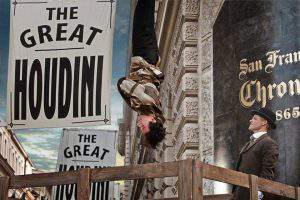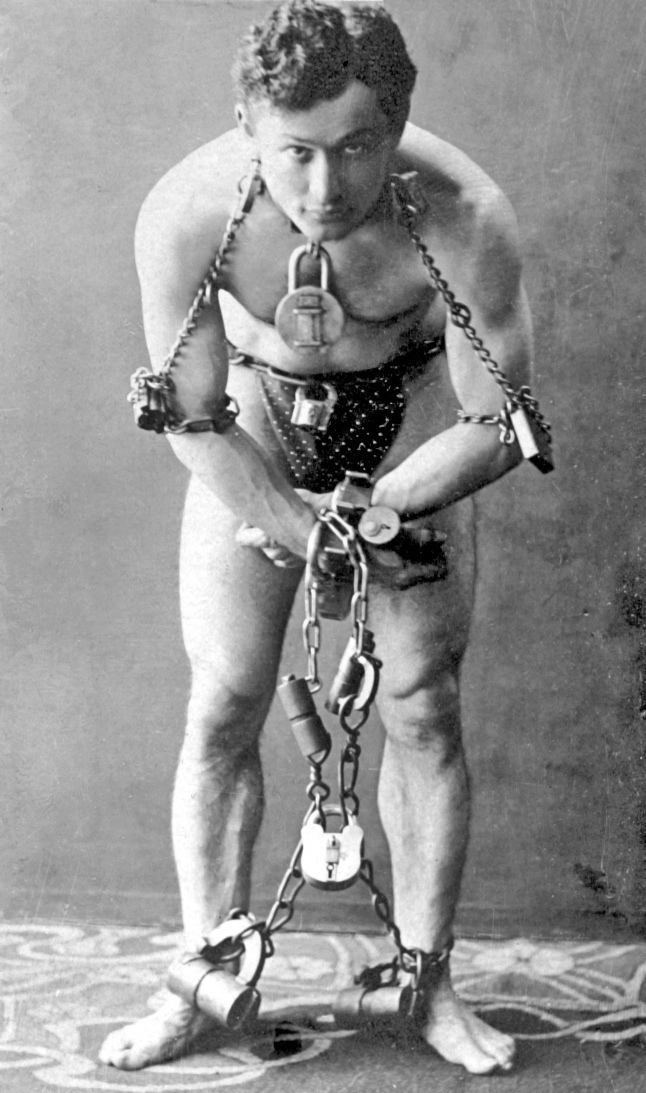Change language:
Harry Houdini, the Hungarian pioneer

Harry Houdini, son of a Rabbi from Budapest, was not only a pioneer in his discipline of entertainment but also a master in breaking the chains of countries’ boundaries as he gained truly international fame.
Houdini is among the most known people in the history of American entertainment. In many ways, his persona may be a convenient symbol of the fate of Central European émigrés. There is even a striking similarity to the one of another American Hungarian Jew, Robert Pulitzer, who turned American media mogul and the founder of a famous journalism prize.

Houdini the Hungarian
Harry Houdini was born in the late 1880s in New York City when teenager Erik Weisz took on performing as a magician and had to find an artistic pseudonym. His choice was to create one after his French colleague Jean-Eugèn Robert-Houdin, then an already dead performer and an important figure in the trade.
Weisz (also known in the American version as Ehrich Weiss) was already a somewhat experienced stunt performer, and it seems that he was driven by the motivation to learn this art. He arrived in the USA as a four-year-old with his parents in a typical way for Central or Eastern European émigrés: aboard a transatlantic ship from Hamburg to New York City.
The Weisz family, headed by Erik’s father Sámuel with his wife and seven children, experienced severe poverty in America and have been in pursuit of happiness in a few regions of the country. Finally, they came back to New York City, and this is where Weisz, or Weiss, as a nine-year-old, took a career as a trapeze artist. Back then, he was known as “Ehrich, the Prince of the Air.”
But he was neither prince nor especially high (career-wise) when he became Houdini, nor was he successful in the first years of his acting. The groundbreaking moment was when he met Martin Beck, a theater owner, and a booking agent; he decided to take on the task of filling the seats for young Houdini. Six years Houdini’s senior, Beck arrived in the USA virtually the same way Erik Weiss did: he was a Hungarian teenager of Jewish descent. He with his family boarded a transatlantic ship from Bremen.
Houdini’s sixty-dollar-gig
Having seen Houdini in one of his performances, Beck telegraphed him: “You can open Omaha, March twenty sixth, sixty dollars, will see act probably make you proposition for all next season.” “This wire changed my whole Life’s journey” – added Houdini on the telegraph, in handwriting, and kept it as a souvenir.
It was Beck who advised Houdini to focus on his career as an escape artist. He also did an excellent job as Houdini’s booking agent. Soon they developed a friendship and started making real money. By 1900 Houdini’s fame crossed the Atlantic.
The last trick
The rest of the story is far better known. Houdini became THE magician, and his name became the synonym for a stunt performer and escape artist. His legacy serves as the image of the early 20th-century magician, and he introduced this trade to modern pop culture. But it was not only his fancy name, smart locks he would open with a key hidden in his mouth, or boxes with double walls that made him famous.
Harry Houdini was an extremely skilled entertainer. In Europe, he challenged local police to hold him shackled in custody – it is probably easy to guess that even the authorities could not have him. And when he was to vanish things – he couldn’t help but choose something as spectacular as an elephant.
Houdini was also a keeper of the trade secrets, keen to sue other magicians for copyright abuse but also ready to unmask fake magicians – spiritualists – among the ‘real’ ones.
He also, to some extent, leaked secrets of the trade. But his own disappearing act remains a secret. Having officially died from appendicitis, he is rumored to receive a few fatal blows to his abdomen by a student who challenged him.He insisted that he believed in the Bible miracles and wanted to check his supernatural stamina, and started to punch him right away. Houdini, as he claimed, was unprepared to stand such an assault. He spent two days in pain, reportedly fainted on stage, and some time later died in hospital.
There is little evidence that this event really occurred, and even if it did, it couldn’t have much to do with appendicitis itself. But that’s stage performing: creating myths to seem more sophisticated.

Source: 3seaseurope.com









